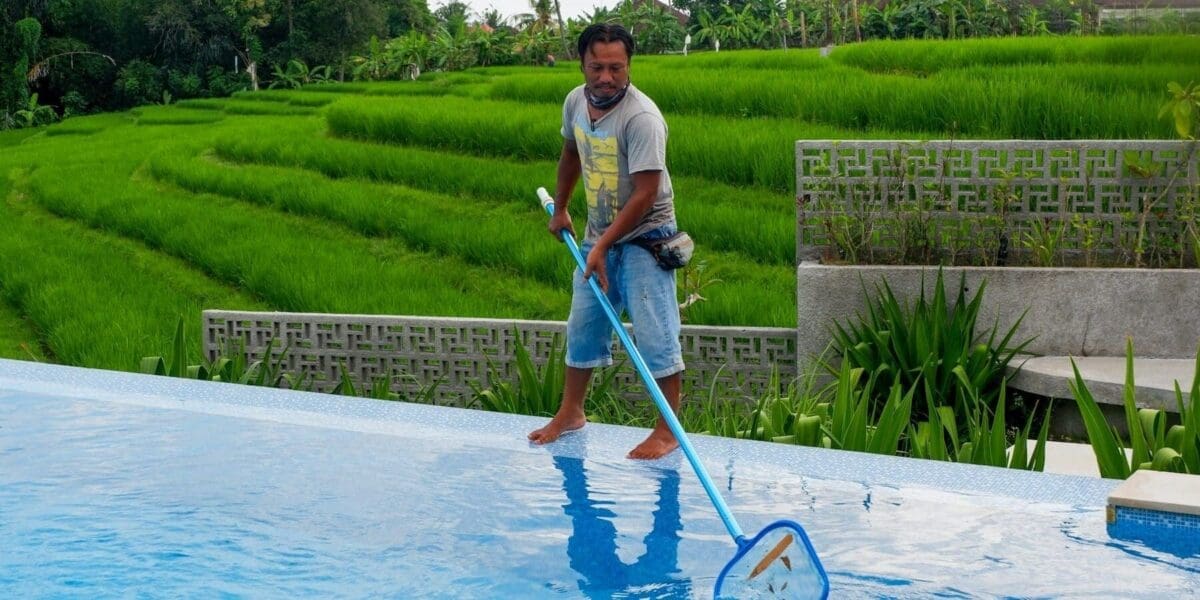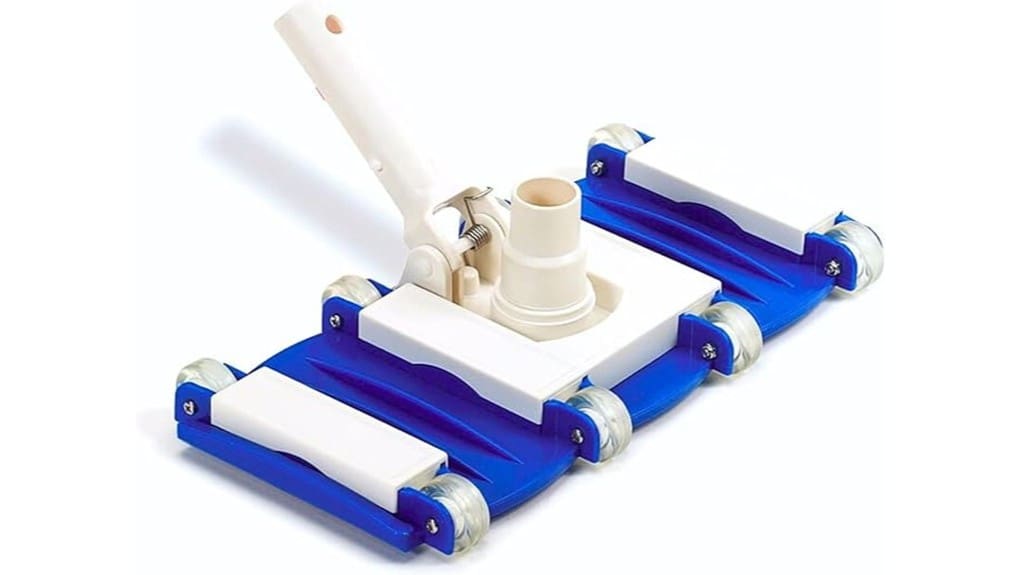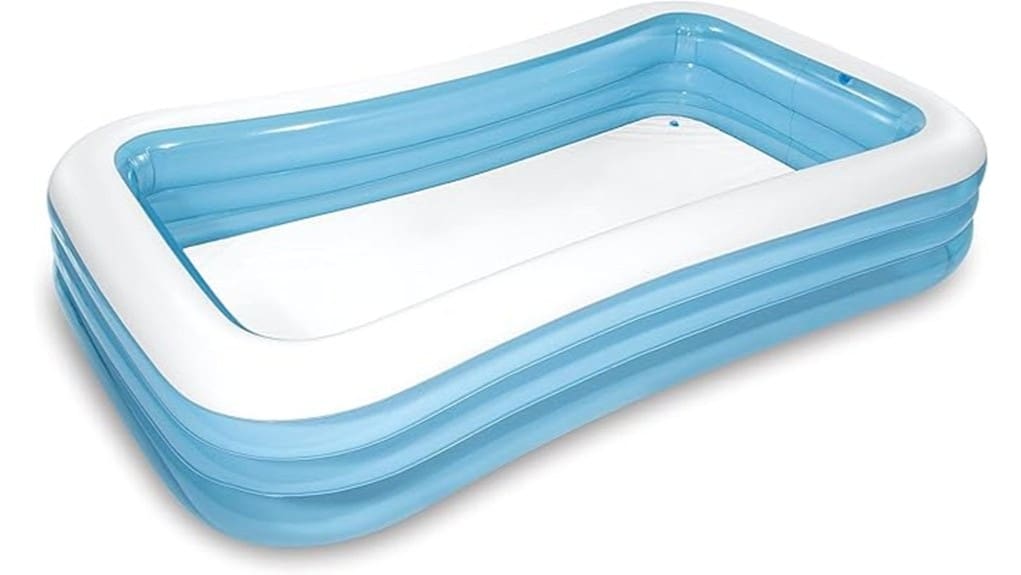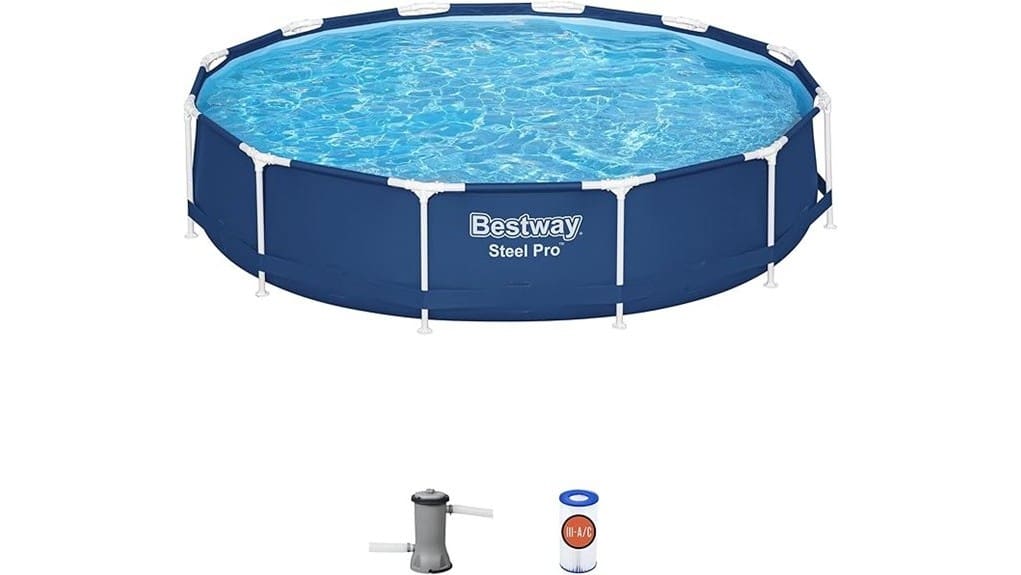Imagine coming home to find your pool filled with leaves and debris after a windy day. You reach for your cleaning tools, but where do you start? Understanding efficient pool cleaning techniques can make a world of difference in maintaining a pristine swimming environment. With expert tips on equipment maintenance and water chemistry, you'll be equipped to tackle any pool cleaning challenge. Stay tuned to uncover the secrets to effortless pool maintenance and enjoy a crystal-clear oasis in your backyard.
Key Takeaways
- Regular vacuuming removes debris and maintains water balance.
- Proper maintenance safeguards pool surfaces and equipment.
- Quality cleaning tools and monitoring ensure efficient pool care.
- Consult professionals for complex pool issues and expert advice.
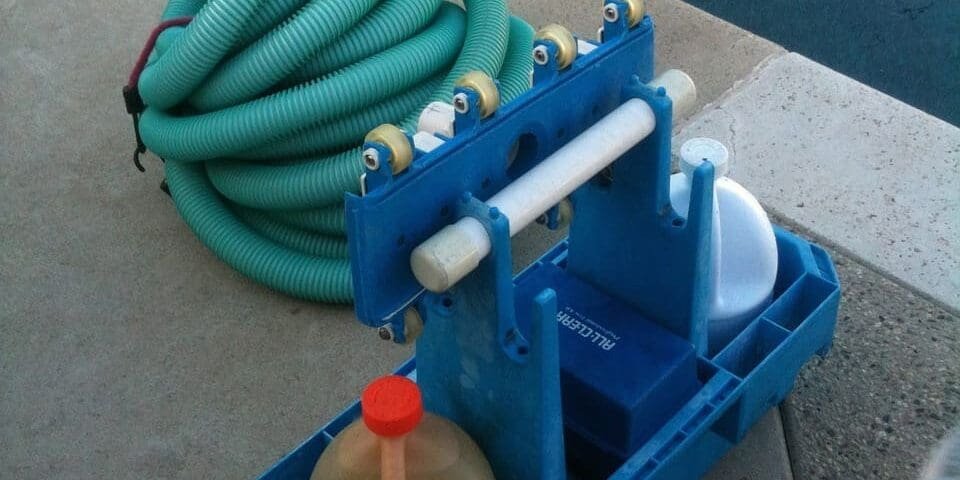
Proper Pool Cleaning Equipment Preparation
When setting up for vacuuming an above-ground pool, gather the essential equipment including a vacuum head, telescopic pole, vacuum hose, and vacuum plate. Proper storage of this equipment is crucial to maintain their functionality and longevity. After vacuuming, ensure you rinse and dry the equipment thoroughly before storing them in a clean and dry area. Additionally, understanding water chemistry is key to effective pool maintenance. Regularly monitoring and adjusting the chemical levels in your pool will not only keep the water safe and clean but also extend the lifespan of your pool equipment. By mastering equipment storage and water chemistry, you pave the way for a sparkling and healthy above ground pool all season long.
Pool Pump and Filter System Setup
To ensure efficient pool maintenance, properly setting up your pump and filter system is essential for optimal water circulation and filtration in your above ground pool. Here are some expert tips for pump and filter system setup:
- Water Flow Optimization: Adjust valves and settings for maximum efficiency.
- Skimmer Attachment: Ensure a secure connection for proper skimming.
- Filter Troubleshooting: Regularly check for clogs or issues to maintain filtration.
- Pump Maintenance: Keep the pump clean and free of debris for smooth operation.
- Regular Inspections: Monitor system performance and address any issues promptly.
Methodical Pool Vacuuming Techniques
For efficient pool cleaning, follow a systematic approach when applying vacuuming techniques to your above ground pool. Begin by preparing your equipment - vacuum head, telescopic pole, vacuum hose, and vacuum plate. Turn on the pump and filter system before starting. Lower the vacuum head slowly into the pool to release air from the hose, then attach it to the skimmer or suction port. When vacuuming, ensure methodical coverage for technique improvements and optimal cleaning efficiency. Move the vacuum head in slow, overlapping strokes to avoid missing any debris. By vacuuming systematically, you will remove dirt, leaves, and algae effectively, keeping your pool clean and in top condition.

Importance of Pool Debris Removal
Removing debris from your pool is crucial for maintaining a clean and safe swimming environment. Here are some essential tips to help you understand the importance of debris removal:
- Regularly skimming the surface to prevent algae buildup.
- Clearing out leaves and twigs to maintain water clarity.
- Using a pool cover during off-seasons to minimize debris accumulation.
- Emptying skimmer baskets frequently for efficient filtration.
- Adjusting cleaning frequency based on seasonal care tips for optimal maintenance.
Protection Against Staining Pool Surface
Regularly maintaining your pool's water balance is essential in protecting against staining and ensuring a clean swimming environment. Preventing discoloration requires diligent monitoring of chemical levels to avoid imbalances that can lead to surface staining. To safeguard your pool, consider using a quality sequestering agent to prevent metals like iron and copper from causing discoloration. Additionally, maintaining proper pH levels and regular brushing can help protect the pool surface. Implementing a routine surface protection plan, including weekly maintenance and the use of appropriate cleaning tools, will aid in preserving the visual appeal of your pool. By staying proactive in preventing staining, you can enjoy a pristine and inviting swimming environment for yourself and your guests.
Pool Water Balance and Chemical Levels
Maintaining proper water balance and chemical levels in your pool is crucial for ensuring a safe and clean swimming environment.
- Monitor pH Levels: Regularly check and adjust pH to prevent skin and eye irritation.
- Balance Chlorine Levels: Ensure chlorine is at the correct level for effective sanitization.
- Test Water Frequently: Use test kits to monitor chemical levels accurately.
- Adjust Chemicals Promptly: Act swiftly to correct any imbalances to prevent algae growth.
- Seek Professional Advice: Consult experts for guidance on maintaining optimal water chemistry.
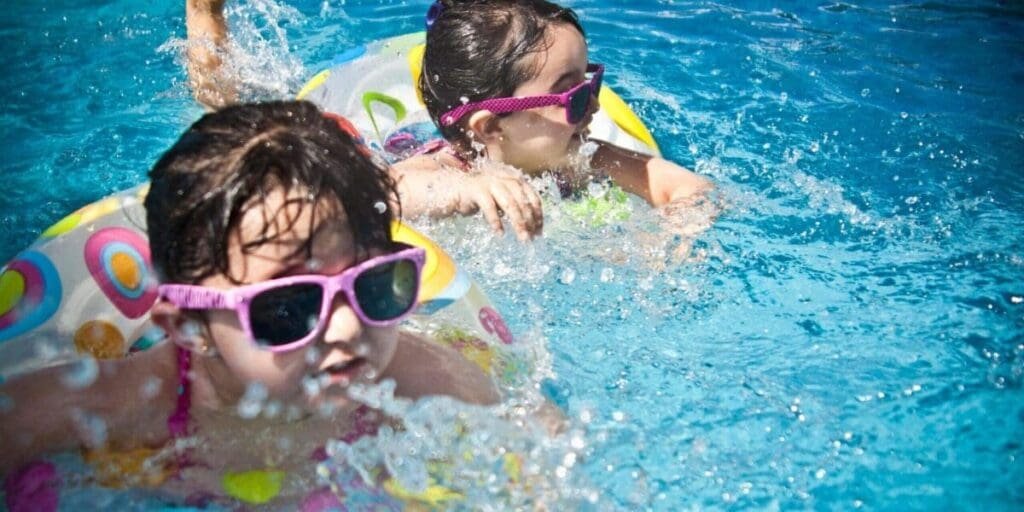
Enhanced Circulation and Filtration for Home Pools
To improve the efficiency of your pool's circulation and filtration system, consider installing a programmable timer for automated operation. This allows for consistent water flow, enhancing filtration performance. A well-maintained filter is crucial for improved water clarity and optimal filtration performance. Regularly backwashing or cleaning the filter ensures it functions effectively. Additionally, keeping the pump and filter system well-maintained is essential for efficient operation. Proper circulation aids in distributing chemicals evenly, preventing algae growth and maintaining water balance. By investing in a quality pump, filter, and timer system, you can achieve enhanced water clarity and ensure your pool maintains optimal filtration performance, creating a clean and inviting swimming environment.
Preventing Contamination and Illnesses
To prevent contamination and illnesses in your pool, ensure consistent and thorough cleaning practices. By taking preventative measures, you not only safeguard your pool but also promote health benefits for everyone enjoying it. Here are some expert tips to help you maintain a clean and safe swimming environment:
- Regularly test and balance the pool water chemistry.
- Keep the pool area clean to reduce the risk of contamination.
- Use a pool cover when the pool is not in use.
- Shower before entering the pool to minimize introducing contaminants.
- Implement a strict "no swimming when sick" policy to prevent the spread of illnesses.
Following these guidelines will help you enjoy a pristine pool while prioritizing the well-being of swimmers.
Regular Pool Filter Maintenance
Ensure your pool filter is regularly cleaned to maintain optimal performance and water clarity. The filter cartridge should be checked and cleaned according to the manufacturer's instructions. A dirty or clogged filter can impede filtration efficiency and lead to cloudy water. If you have a sand filter, consider periodic sand replacement to ensure proper filtration. Follow guidelines on the amount and type of sand needed for your specific filter. Regular maintenance of your filter system is crucial for keeping your pool water clean and inviting. By staying on top of filter care, you can enjoy a sparkling pool all season long without issues caused by poor filtration.
Maintaining Efficient Pool Pump Systems
Regular maintenance of your pool filter and pump system is vital for optimal performance and water clarity. To ensure your system operates efficiently, follow these expert tips:
- Check for leaks in pipes and connections regularly.
- Clean pump baskets and remove debris to prevent clogs.
- Monitor pressure gauges for any fluctuations indicating issues.
- Backwash the filter as recommended to maintain proper flow.
- Consider upgrading to a variable-speed pump for maximizing performance.
Conclusion
By following these expert tips for maintenance, you can keep your above-ground pool clean and inviting all season long. Proper equipment preparation, efficient vacuuming techniques, and regular filter maintenance are essential for a pristine swimming environment. With the right tools and techniques, you can enjoy crystal-clear water and extend the lifespan of your pool equipment. Don't let pool maintenance be a hassle - invest in quality cleaning tools and enjoy a safe and enjoyable swimming experience.
Questions & Answers

Q: Can Above Ground Pools Be Easily Converted to Saltwater Systems for Maintenance?
Yes, above ground pools can be easily converted to saltwater systems for maintenance. This conversion process offers benefits like softer water and lower chemical usage. It may increase initial costs but reduces maintenance expenses in the long run. Saltwater systems are efficient and require less manual intervention once set up. Consider this switch for a more enjoyable and cost-effective pool experience.
Q: What Are Some Common Mistakes to Avoid When Vacuuming an Above Ground Pool?
When vacuuming your above ground pool, proper technique is key. Avoid common mistakes by preparing your equipment correctly and maintaining it regularly. Make sure to turn on the pump and remove air from the hose before attaching it to the skimmer. Vacuum methodically for complete coverage. Remember, keeping your equipment in good condition ensures efficient pool cleaning and extends the lifespan of your pool.
Q: How Often Should Pool Owners Check and Adjust the Water Chemistry Levels?
When maintaining your pool, regularly check and adjust water chemistry levels. Testing water balance and adjusting chlorine levels is crucial for optimal pool health. Experts recommend checking water chemistry at least once a week to ensure proper balance and adjust chemicals accordingly. Consistent monitoring helps prevent algae growth, maintains water clarity, and protects swimmers from potential health risks. Stay on top of water chemistry for a clean and safe swimming environment.
Q: Are There Any Specific Tips for Storing Pool Vacuum Equipment to Prolong Its Lifespan?
When storing your pool vacuum equipment, ensure proper storage is key to prolonging its lifespan. After use, clean and dry the vacuum head and hose thoroughly. Store them in a dry, shaded area to prevent damage from sunlight or moisture. Establish a maintenance schedule to regularly inspect and maintain your equipment. By following these steps, you'll keep your pool vacuum in top condition for efficient cleaning and extended use.
Q: What Are Some Signs That Indicate a Pool May Need Professional Maintenance Beyond Regular Cleaning and Upkeep?
If your pool shows persistent leaks, irregular water levels, or unusual pump noises, it may need professional inspection. Engage repair services promptly to prevent further damage. Regular pool inspection helps detect issues early, ensuring timely repairs. To maintain your pool's health, prioritize preventative measures and equipment maintenance. Expert advice and timely action can keep your pool in top shape, safeguarding your investment and ensuring a safe swimming environment.
